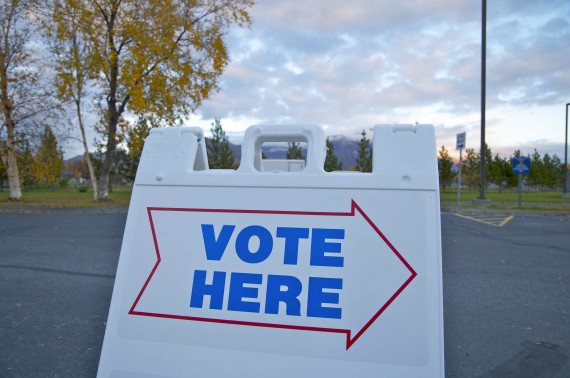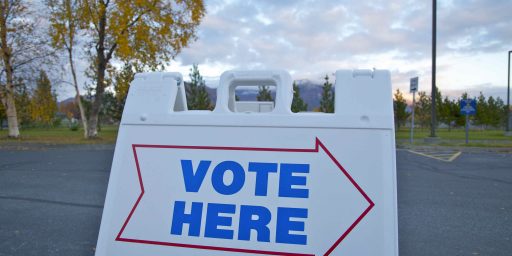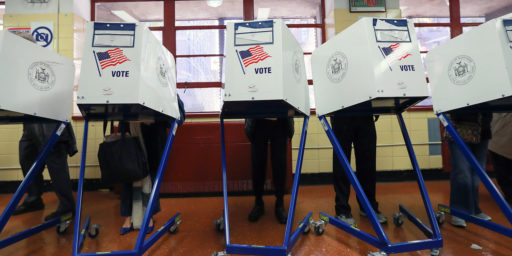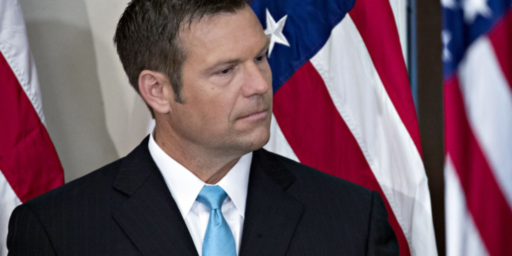Kansas And Arizona Creating Two-Tiered Voting Systems
Two states are creating a voting system that will make some people ineligible to vote in state and local elections.
As you may recall, at the end of the Supreme Court’s last term, the Court handed down a decision dealing with an Arizona law that purported to create a requirement that residents of the state must present proof of citizenship prior to registering to vote. The Court struck the law down because it was pre-empted by a Federal Law that has been the law for some 20 years known as the “Motor Voter Bill.” At its most basic level, the Court ruled that Arizona could not impose requirements beyond those required by the Federal Law, at least not for Federal elections. At the time, noted that Arizona could apply to have its separate requirements approved by the relevant Federal agency charged with the enforcing the law. Instead, though, it appears that the state has decided to join Kansas in going in an entirely different direction that would effectively set up a two-tiered voting system that could make some people ineligible to vote in statewide elections:
Arizona and Kansas, where top state posts come up for grabs next year, are creating two-tiered voting systems to bar some residents from casting ballots in all but congressional races unless they prove they’re U.S. citizens.
The dual methods are in response to a U.S. Supreme Court ruling in June that bars Arizona from rejecting federal voter-registration forms that don’t include proof of citizenship, which is required by both states. To comply, both plan to provide those voters with ballots listing just federal races.
“It is quite likely going to disenfranchise a number of voters,” said Julie Ebenstein, a lawyer with the Voting Rights Project of the American Civil Liberties Union in New York.
“It is going to cause a lot of expense to county election officials and confusion.”
State officials say they have little choice: the high court didn’t invalidate the statutes that require proof of citizenship to vote in state and local races. Critics say the mandates are designed to impede ballot access for minorities, the poor and older residents who may not have the needed documentation, such as a passport or a birth certificate.
“It’s a little bit of a mess for election officials,” said Matt Roberts, a spokesman for Arizona Secretary of State Ken Bennett. “We found ourselves in the middle of these two things.”
(…)
Supporters of the proof-of-citizenship requirements, passed by ballot initiative in Arizona in 2004 and by Kansas lawmakers in 2011, say they’re needed to ensure that noncitizens don’t participate in elections. On the federal form, created as part of the so-called “Motor Voter Law” intended to make registration easier, applicants swear that they are citizens, under penalty of perjury.
The state measures reflect larger battles over ballot access and the role of states in combating illegal immigration. In the months leading up to last year’s presidential election, Republicans pushed new laws requiring voters to present identification at the polls and other measures they said were needed to prevent fraud. Democrats cried foul, charging that the laws sought to suppress participation by those likely to favor their candidates, such as young people and Latinos.
Kay Curtis, spokeswoman for Kansas Secretary of State Kris Kobach, said her state’s requirements aren’t set up to prevent voting by anyone who is eligible. Kobach, a Republican, is credited with helping Arizona lawmakers draft a 2010 immigration law that was mostly struck down by the Supreme Court in 2012.
“The law applies to every Kansan equally,” she said.
As a matter of law, this likely isn’t unacceptable on its face. Under the Constitution, Congress generally only has the authority to regulate matters related to Federal Elections while all other election requirements, including the terms for who is eligible to vote in state and local elections, is left up to the states. This is why the Motor Voter Bill applies only to how eligibility to vote in Federal Elections is determined. The only exceptions to this general rule come into place when there is evidence of discrimination in the state law, which typically requires that it was either adopted with the specific intent to impede the voting rights of protected minorities, or that its application has a disparate impact on such groups. Issues like that, of course, typically cannot be determined until the law has actually gone into effect. Essentially then, there is no specific rule forbidding Kansas and Arizona from doing this.
As Emily Badger notes, though, it’s still a pretty bad idea as far as policy goes:
This idea will have two obvious and unfortunate consequences: It will create mass confusion (TPM writes that Kansas is envisioning four different registration scenarios involving two different registration forms, with some people left ineligible to vote in any election). And by creating greater barriers to registration specifically in non-federal elections, the idea threatens to particularly impact elections for offices like mayor, city council, and state representative.
We already know that turnout in local elections tends to be dramatically lower than in national ones, with direct implications for who gets elected. If anything, we should be trying to find ways to boost local election turnout, not curtail it even further. History has also shown that the political representation of minorities in offices like city council has expanded over time right alongside protections for their voting rights.
The logistical headaches of trying to maintain two different voter lists, one for state elections and the other for Federal elections, would seem to be rather obvious. The people who maintain the rolls would be confused, the poll workers would be confused, especially in years where there are both Federal and state/local offices on the same ballot. One estimate states that the law would cost counties in Arizona an additional $200,000 to $250,000 per election cycle, and one assumes that the costs would be similar in Kansas, at least in the more heavily populated areas of the state. Purely as a matter of good government and fiscal conservatism, then, there would seem to be no justification for this law that could be said to be independent of the desire to make sure that certain people don’t vote.
None of this should be a surprise, though. As noted, Kansas Secretary of State Kris Kobach, who has been rumored to have ambitions of running for Governor some day, has been the one of the chief national movers behind the wave of restrictive voting and immigration laws that have swept the country in recent years. He was largely the architect of Arizona’s SB 1070, major parts of which were struck down by the Supreme Court, and played a role in crafting similar laws in other parts of the country. The fact that he came up with this idea shouldn’t really be surprising, and strikes me as one reason to be very suspicious of the motivations behind it.







All men are created equal…’cept thems that don’t look or talk like us.
“Separate, but equal.” I’ve heard that before.
All men are created
equal…So if you pay attention long enough you realize that the only part of the Constitution that Republicans like is the 2nd…apparently they like it when kids shoot themselves in the face.
All animals are equal, but some animals are more equal than others
Why do Republicans hate democracy?
This is the part that ought to get them tossed by the courts. It is explicitly _not_ in the purview of _any_ state to have an opinion on whether or not someone is a US citizen. _Only_ the federal gov’t can define that. If individual states don’t like the standard of identification the feds use to determine citizenship, there is flatly _nothing_ those states can do about it. Period. In an extreme case, states that don’t feel the feds are doing their Constitutionally-mandated job can have their AGs file a lawsuit to force the federal gov’t to act, but barring that, the opinion of a state on someone’s nationality has no weight whatsoever, and requiring proof of US citizenship to vote in a _state_ election, above & beyond what the federal gov’t itself requires to vote in a national election, is simply indefensible.
The champions of small government want a more expensive voting system? This defies comprehension!
Imagine a world where Republicans try to win majorities by having rational policies and popular, well-considered positions on the issues!
Imagine a Republican party that stands for keeping the best of what made America strong: fighting unreasonable government overreach – but recognizing and honoring government’s legitimate role in regulating the free market (which, rightly, primarily serves the owner-class).
Imagine a Republican party that builds and nurtures a thriving middle-class, helping to elevate those in poverty to become active consumers, while striking a fair balance between the rights of both workers and risk-taking business owners to each see a great reward for their investments.
You may think I’m a dreamer, but I’m not the only one……
@mantis:
“Why do Republicans hate democracy?”
Because if they cannot deny the voting right to groups likely to vote Democratic, they have little chance of winning. But you knew that already.
@Tony W,
Today, they would be called Democrats.
@Tony W:
but recognizing and honoring government’s legitimate role in regulating the free market (which,
rightlywrongly, primarily serves the owner-class).FTFY.
All men are created equal but some by birth or law are U.S. citizens, the others are not. And only U.S. citizens can vote in elections.
The U.S. government has chosen to have a person swear they are a citizen and, theoretically, prosecute those who are found to have lied. Arizona and Kansas have chosen to ask for proof up front. The fact the U.S. government doesn’t seek to maintain the integrity of the elections they oversee does not mean that the states must degrade their elections to the same level.
It is perhaps cumbersome having two systems but the issue arises because the federal government has chosen not to verify the voter’s eligibility to vote prior to registering.
I remember this guy. He briefly flirted with removing Obama from the Kansas 2012 Pres. Election ballot because of Birtherism, but then eventually pulled back after a lot of negative press:
http://takingnote.blogs.nytimes.com/2012/09/14/kansas-birthers/
@ JKB
I don’t believe that you are a citizen. You should probably go find a blog for non-citizens to post on.
Not all people are created citizens. Only citizens have a right to vote.
Simple, if you believe in the law.
@mantis:
Perhaps they see it conflicting with free market capitalism?
@Motopilot:
And unicorns. Don’t forget the unicorns.
I don’t really understand this tactic. The old people who don’y have photo ID are dying off and how many of the baby boomers don’t have photo ID? This is only pi$$ing people off. Just another example of the Republican lemming suicide march off the cliff.
Not surprising, as we now know they’re like cockroaches – nearly impossible to stomp out.
Kansas has decided to become a Southern state, and Arizona has been the crazy train since Jan Brewer and Joe Arpaio have been running things.
All evidence shows that the real problem with voter fraud comes out of absentee voting, not in-person voting, yet, of course they’re transparently ginning up their voter suppression efforts in order to reduce the Democratic Party vote. The new demographic trends cannot happen soon enough.
The New Confederacy marches on. How long before there are pass laws for the browns residing in Kansas?
@OzarkHillbilly: That is precisely why Capitalism needs government regulation.
For some reason my immediate reaction to the title was surprise and incredulity that Kansas and Arizona were implementing mixed member proportional representation.
*sigh*
“All animals are equal, but some animals are more equal than others.”
Chris Kobach? This one?
“In his bid for Kansas secretary of State, Kobach raised the question of whether President Barack Obama’s short-form birth certificate was sufficient to prove his citizenship. Later, when called on it, Kobach backtracked and said that he believed in the president’s citizenship but still maintained that questioning his birth certificate was valid.” http://www.americanprogress.org/issues/immigration/news/2012/06/26/11661/the-top-5-things-you-need-to-know-about-kris-kobach/
An idiot Birther dreamt up this scheme to lower voter participation. What a shocker.
oh great, more on how those “dumb minorities” can’t seem to join the party and get id’s and such….sure.